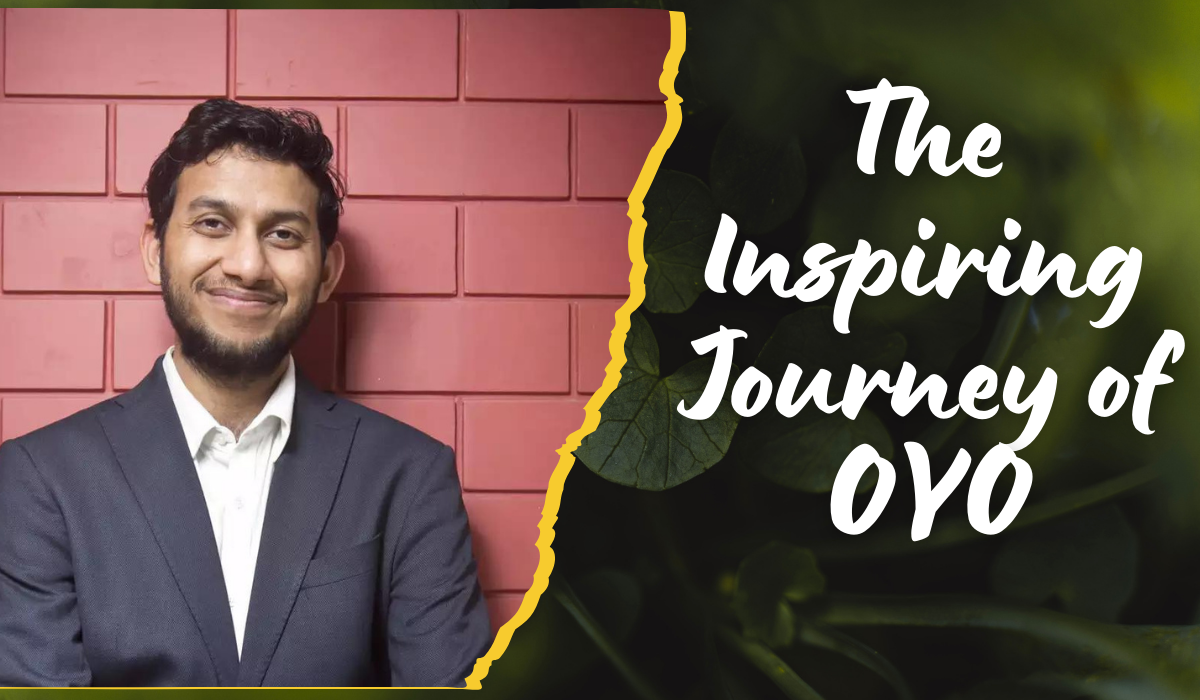In the dynamic landscape of India’s hospitality industry, few stories are as captivating as that of OYO Rooms and its founder, Ritesh Agarwal. From humble beginnings to becoming a global hospitality powerhouse, OYO’s growth strategy has redefined the rules of the game. This article delves deep into the journey of Ritesh Agarwal, exploring the innovative approaches and pivotal decisions that shaped OYO’s remarkable success story.
From SIM Cards to Revolutionizing Hospitality
Ritesh Agarwal’s entrepreneurial journey began long before OYO came into existence. As a teenager in Odisha, he found himself selling SIM cards for Airtel, a experience that would later inform many of his business decisions. “I started doing this in my sixth grade during summer holidays,” Agarwal recalls, “partly because there was nothing much to do and I was this rebel who wanted to try and do everything new I could.”
This early venture provided Agarwal with invaluable insights into the Indian market:
- Understanding small business owners
- The importance of emotional validation over monetary incentives
- The power of creative marketing strategies
For instance, instead of offering cash incentives to store owners for selling SIM cards, Agarwal arranged dinners at the town’s only “fancy” hotel. This innovative approach not only saved costs but also created a sense of prestige among the sellers.
The Birth of OYO: From ORAVEL to a Hospitality Giant
The seeds of OYO were sown during Agarwal’s travels across India. Frustrated by the lack of affordable, quality accommodations, he saw an opportunity to bring unavailable properties online. Initially starting as a blog listing unique, undiscovered places to stay, the idea evolved into ORAVEL, a platform for booking budget accommodations.
However, Agarwal soon realized that merely providing an online booking service wasn’t enough. The small businesses he partnered with needed more comprehensive support. This insight led to the pivot from ORAVEL to OYO, with a focus on becoming a single provider for the entire premises – handling distribution, branding, franchising, and property upgrades.
Unlock Your Dream Home Today!
Get personalized real estate insights delivered straight to your inbox.
The Peter Thiel Fellowship: A Turning Point
A crucial moment in OYO’s growth strategy came when Agarwal was selected for the prestigious Peter Thiel Fellowship. This program, which offers young entrepreneurs $100,000 to drop out of college and pursue their business ideas, provided Agarwal with not just funding but also invaluable networking opportunities and mentorship.
Key takeaways from the Thiel Fellowship experience:
- Exposure to global entrepreneurial thinking
- Emphasis on setting tangible, impactful goals
- The importance of perseverance and openness to new ideas
Agarwal’s application stood out due to his contrarian belief that young people could disrupt the hospitality sector, traditionally seen as an industry where experience was paramount.
OYO’s Unique Business Model: Revolutionizing Budget Hospitality
OYO’s growth strategy centered around a unique business model that addressed key pain points in the budget hospitality sector:
- Zero Commission Model: Unlike traditional platforms that charge 30-40% commission, OYO takes no commission from hotel owners. Instead, they monetize through performance advertising by sellers on their platform.
- Faster Payment Cycles: OYO reduced payment cycles from the industry standard of 14-19 days to just 7 days, significantly improving cash flow for hotel owners.
- No Private Labels: Unlike competitors, OYO doesn’t compete with its own sellers by creating private label brands.
- Asset-Light Model: OYO doesn’t own hotels, instead focusing on franchising and managing properties.
- Equal Opportunity for All Sellers: OYO doesn’t practice seller tiering, treating all partners equally regardless of their size or performance.
This innovative approach allowed OYO to rapidly scale across India, particularly in tier 2 and tier 3 cities often overlooked by competitors.
Overcoming Challenges: The 2019 Crisis and COVID-19
OYO’s growth strategy faced significant tests in 2019 and during the COVID-19 pandemic. In 2019, the company faced criticism for rapid expansion that outpaced its ability to maintain quality and support. Agarwal candidly admits, “We reflected by the end of 2019 that we probably had grown quicker than we should have in terms of our plan.”
The COVID-19 pandemic presented an even greater challenge, with OYO losing 70% of its revenue overnight. However, the company’s response demonstrated the resilience built into its strategy:
- Consolidation of operations
- Focus on fewer, key markets
- Shift away from minimum guarantee models to pure franchising
- Raising substantial capital to weather the storm
These moves allowed OYO to not only survive but emerge stronger from the crisis.
Key Lessons from OYO’s Journey
- Validate Before Scaling: Agarwal emphasizes the importance of achieving product-market fit before rapid expansion. “Keeping sustainable outcome which works for the customer and the partners and yourself combined is what you need to find before you scale rapidly,” he advises.
- Focus Beyond Tier 1 Cities: A crucial element of OYO’s growth strategy was its early focus on tier 2 and tier 3 cities. This allowed the company to build a strong base in underserved markets while competitors fought over the top 15 cities.
- Innovative Distribution Strategies: For the first two years, OYO operated without a mobile app, relying instead on call center bookings. When they did launch an app, they focused on referral-based growth rather than expensive above-the-line marketing.
- Build Strong Management Leadership: Agarwal credits much of OYO’s success to building a strong, value-driven leadership team that could navigate both highs and lows.
- Leverage Word-of-Mouth in the Industry: In the hospitality sector, reputation spreads quickly. OYO focused on creating positive experiences for early adopters, leading to organic growth through recommendations.
- See Capital as an Outcome, Not Just Input: While OYO has raised significant funding, Agarwal views this as a result of executing well rather than the primary driver of success.
- Seize Opportunities: Agarwal’s journey is marked by his willingness to seize opportunities, even when the odds seemed long. From applying to the Thiel Fellowship to making bold decisions in fundraising, his advice is clear: “When the opportunity comes, take it with both hands.”
The Future of OYO
As OYO continues to evolve, its growth strategy remains centered on innovation and adaptability. The company has expanded beyond its initial budget hotel focus, now offering options across various price points and even venturing into the home rental market.
Key areas of focus for OYO’s future growth include:
- Continued technological innovation to improve both guest and hotel partner experiences
- Expansion into new international markets
- Diversification of offerings to cater to changing travel preferences
- Strengthening financial fundamentals to achieve sustained profitability
Lessons for Aspiring Entrepreneurs
The story of OYO and Ritesh Agarwal offers valuable insights for aspiring entrepreneurs:
- Identify and Solve Real Problems: OYO’s success stems from addressing genuine pain points in the budget hospitality sector.
- Be Willing to Pivot: The transition from ORAVEL to OYO demonstrates the importance of adapting your business model based on market feedback.
- Think Beyond Conventional Wisdom: Agarwal’s contrarian approach to many aspects of the business, from commission structures to expansion strategies, has been key to OYO’s unique position in the market.
- Build Strong Partnerships: OYO’s focus on empowering hotel owners and building long-term relationships has been crucial to its rapid expansion.
- Embrace Challenges as Learning Opportunities: From the 2019 crisis to the COVID-19 pandemic, OYO’s ability to learn and adapt from challenges has been instrumental in its resilience.
As Ritesh Agarwal continues to lead OYO into new territories and challenges, his journey remains a testament to the power of innovative thinking, perseverance, and the ability to execute a bold vision. The OYO growth strategy, marked by its focus on empowering small business owners, leveraging technology, and constantly adapting to market needs, offers a blueprint for success in the digital age.
For entrepreneurs looking to make their mark, the OYO story serves as both inspiration and a practical guide. It demonstrates that with the right strategy, even the most traditional industries can be disrupted and transformed. As the hospitality landscape continues to evolve, OYO’s journey will undoubtedly continue to offer valuable lessons for the business world at large.
Ritesh Agarwal was inspired to start OYO after experiencing frustration with the lack of affordable, quality accommodations during his travels across India. This led him to identify a significant gap in the hospitality market.
Agarwal's early experiences selling SIM cards taught him valuable lessons about understanding small business owners, the importance of emotional validation over monetary incentives, and the effectiveness of creative marketing strategies.
OYO's business model includes a zero commission approach for hotel owners, faster payment cycles, an asset-light model focusing on franchising, and equal opportunity for all sellers, allowing for rapid scaling across underserved markets.
The Peter Thiel Fellowship provided Ritesh Agarwal with crucial funding, networking opportunities, and mentorship, which were significant in shaping his entrepreneurial journey and OYO's growth strategy.
OYO faced criticism for its rapid expansion in 2019, which outpaced its ability to maintain quality. Additionally, the COVID-19 pandemic resulted in a 70% revenue loss, testing the company's resilience.
Agarwal emphasizes the importance of validating product-market fit before scaling rapidly, ensuring that sustainable outcomes benefit customers, partners, and the business.
OYO adapted by consolidating operations, focusing on key markets, shifting to a pure franchising model, and raising capital to navigate challenges during the COVID-19 pandemic.
Future growth areas for OYO include technological innovation, expansion into new international markets, diversification of offerings, and strengthening financial fundamentals for sustained profitability.
Agarwal advises aspiring entrepreneurs to identify and solve real problems, be willing to pivot based on market feedback, think beyond conventional wisdom, build strong partnerships, and embrace challenges as learning opportunities.
Focusing on tier 2 and tier 3 cities allowed OYO to build a strong base in underserved markets, differentiating itself from competitors who concentrated primarily on larger cities.
DISCLAIMER
The information provided on this website is for general informational purposes only. While we strive to keep the content up-to-date and accurate, we make no representations or warranties of any kind, express or implied, about the completeness, accuracy, reliability, suitability, or availability of the information, products, services, or related graphics contained on this website.
In no event will we be liable for any loss or damage including without limitation, indirect or consequential loss or damage, or any loss or damage whatsoever arising from loss of data or profits arising out of, or in connection with, the use of this website.
Real Estate Investment Risks
Real estate investments involve significant risks and market volatility. Property values, rental rates, and market conditions can fluctuate. Past performance is not indicative of future results.
Before Making Real Estate Decisions
Before making any real estate decision, we strongly advise you to:
- Conduct thorough due diligence
- Consult with qualified legal, financial, and real estate professionals
- Carefully review all relevant documents and contracts
- Consider your personal financial situation and investment goals
This website does not provide legal, financial, or investment advice. All content is for informational purposes only and should not be construed as professional advice or recommendations.
By using this website, you acknowledge and agree to these terms. We reserve the right to modify this disclaimer at any time without notice.







